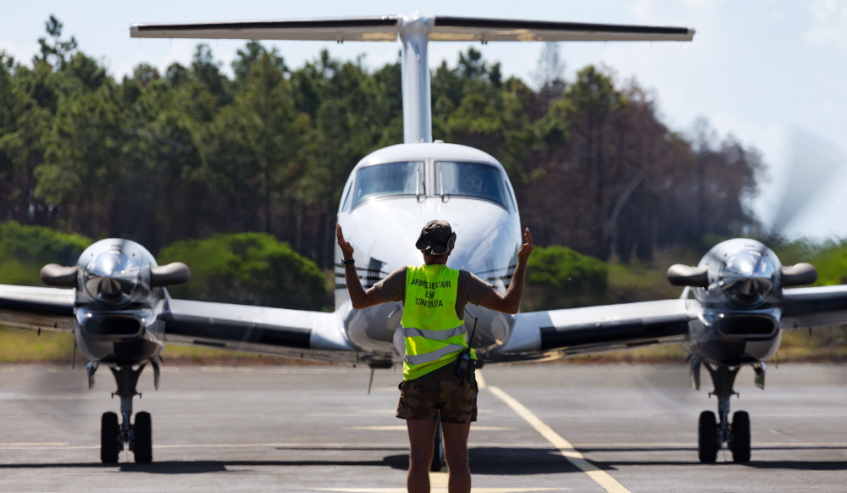The last two weeks have seen Queensland’s defence sector take a hit, with Defence confirming that 38 Squadron will be relocated to Victoria and an iconic helicopter business announcing its plans to relocate from Queensland to South Australia.
The Sunshine Coast's Becker Helicopters, which was founded in 1995 and provides pilot training services for military personnel, recently confirmed it is on its way out, heading down to South Australia after more than two decades in the sunshine state.
Discussions are underway between Becker Helicopters, the University of South Australia and TAFE SA to form training partnerships, facilitating the delivery of degree-level and vocational aviation and aerospace training courses in Whyalla.
Becker Helicopters chief executive Jan Becker said the the South Australian government, through Defence SA, has helped facilitate the upcoming move.
"We are proud that South Australia is going to be home for our major training capabilities and have been overwhelmed by the support and assistance we have been receiving from the local Whyalla Council and the South Australian government through Defence SA," Becker said.
A spokesperson for Queensland's Department of State Development, Manufacturing, Infrastructure and Planning told Defence Connect the state government is "disappointed" it could not reach an agreement with Becker Helicopters to remain in the Sunshine Coast.
"The Queensland government recognises the significant contribution that Becker Helicopters has made to Queensland and the Sunshine Coast over the past 20 years in growing an operation that is now recognised globally," the spokesperson said.
"The Queensland government worked with Becker Helicopters over many years to try to accommodate their training requirements. It is, of course, disappointing that Becker Helicopters were not, with any certainty, able to realise solutions that could accommodate their future flight training school operations on the Sunshine Coast."
The Townsville-based eight-plane Beechcraft King Air fleet is also on its way out and will move to Victoria's RAAF Base East Sale after nearly 10 years in Queensland. RAAF Base East Sale is the home of the RAAF's other eight-plane fleet of King Airs.
The Department of Defence said the decision is "a result of a sufficiently mature C-27J Spartan capability, and in accordance with the Capability Development Plan, King Air operations within 38 Squadron will transition to 32 Squadron over the course of 2018".
The Queensland Department of State Development, Manufacturing, Infrastructure and Planning spokesperson told Defence Connect the move is a loss for the Townsville community, but the state will still remain a key player for Australia's Air Force.
"The Queensland government is aware that Defence makes strategic decisions based on operational requirements," the spokesperson said.
"While the reassignment of 38 Squadron’s eight Beechcraft King Air light transports is a loss for Townsville, the deployment of 35 Squadron and their C-27J Spartan heavy transports to RAAF Base Amberley shows that Queensland, as home to Australia’s military airbase, remain of pre-eminent importance."
The C-27Js based in Queensland will spend much of their time deployed to Townsville and Cairns, as well as Puckapunyal in Victoria and Edinburgh supporting Cultana (SA).
The spokesperson added the state government's plans to establish both a manufacturing hub and a $5 million defence maintenance and logistics hub in the city complement "the expenditure coming from the increased presence of the Singapore Armed Forces undergoing training in northern Queensland, maintenance of the Bushmaster, Hawkei, LAND 121 and LAND 400 vehicles, and Chinook helicopters currently or planned to be based in Townsville and upgraded facilities at RAAF Base Townsville to support F-35 Joint Strike Fighters and P8 Aircraft".
Queensland recently secured Defence's first Co-operative Research Centre (CRC) for trusted autonomous systems, a project receiving an investment of $50 million from the federal government under the Next Generation Technologies Fund.
The centre will focus on how drones, robotics and artificial intelligence can play a key role in Australia's future military.
Defence primes Thales Australia, BAE Systems Australia, Lockheed Martin Australia and Defence Science and Technology Group are among the key participating members, along with universities and research agencies. Boeing Australia and Data61 are also undergoing discussions for their future in the CRC.
The state is also hoping to secure the $5 billion LAND 400 Phase 2 project which would see 225 Combat Reconnaissance Vehicles constructed in the state if Rheinmetall is selected as the successful tenderer over BAE Systems Australia. BAE will build the vehicles in Victoria if it secures the project.






